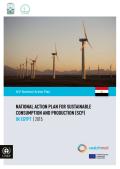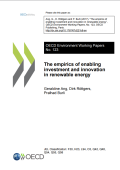
This working paper undertakes econometric analysis to assess the impacts of climate mitigation policies and the quality of the investment environment on investment and innovation in renewable power in OECD and G20 countries. It also assesses how countries’ investment environments interact with climate mitigation policies to influence investment and patent activity in renewable power. The paper gathered and tested data across OECD and G20 countries on more than 70 explanatory variables, which were analysed using two Poisson-family regression models: one to investigate determinants of investment flows in renewable power from 2000 until 2014; and one to investigate determinants of patent counts in renewable-power technologies from 2000 until 2012.
Results of the econometric analysis are consistent with the main hypothesis in this paper that beyond setting climate mitigation policies, policy makers need to strengthen the general investment environment and align it with climate mitigation policies in order to mobilise investment and innovation in renewable power across OECD and G20 countries.
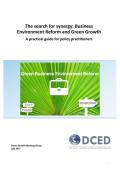
Business Environment Reform (BER) and Green Growth (GG) are both important parts of and strategies for sustainable development of emerging economies. While these two policy domains have their own core objectives and implementation strategies, there is a high potential for bringing out synergies but also to mitigate risks of trade-offs.
This practical guide is addressed to policy makers and development practitioners working on GG and BER. This purpose of this guide is to support program designers and managers at donor agencies, policy makers, development practitioners and evaluators in leveraging these synergies and avoiding trade-offs. The guide is meant for professionals working on BER and/or GG and those wishing to include elements and synergies in related policy areas.
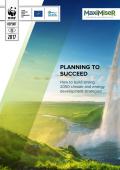
The importance and value of 2050 strategies that seek to cut greenhouse gas emissions while also ensuring well-being and prosperity have been acknowledged by policy makers, advocates, and businesses for many years. However, there is no formal multi-lateral or international guidance as to what such strategies should contain or how they should be developed. While this is an important deficit that should be corrected, it is somewhat mitigated by a strong body of independent papers.
This paper aims to be a starting point for policy makers who are seeking to either develop their country’s first 2050 decarbonisation plan, or to strengthen their existing plan. The literature reviewed for these guidelines ranges from legislative texts and governmental agency reports to the outputs of independent research projects. While national circumstances will require some differences between countries’ 2050 strategies, the consistency with which the various papers identify the essential building blocks of a strong 2050 strategy should be noted.
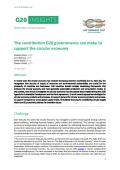
In recent years the circular economy has received increasing attention worldwide due to, inter alia, the recognition that security of supply of resources and environmental sustainability are crucial for the prosperity of countries and businesses. G20 countries should consider developing frameworks that enhance the circular economy and more generally sustainable production and consumption modes. In this context, they should 1) integrate the circular economy into discussions about implementing the 2030 Agenda for Sustainable Development and the Paris Agreement, 2) work towards agreed terminologies for circular economy products and processes, 3) support demand for circular economy products and services, 4) support transparency across global supply chains, 5) facilitate financing for establishing circular supply chains and 6) proactively address the transition issues.
